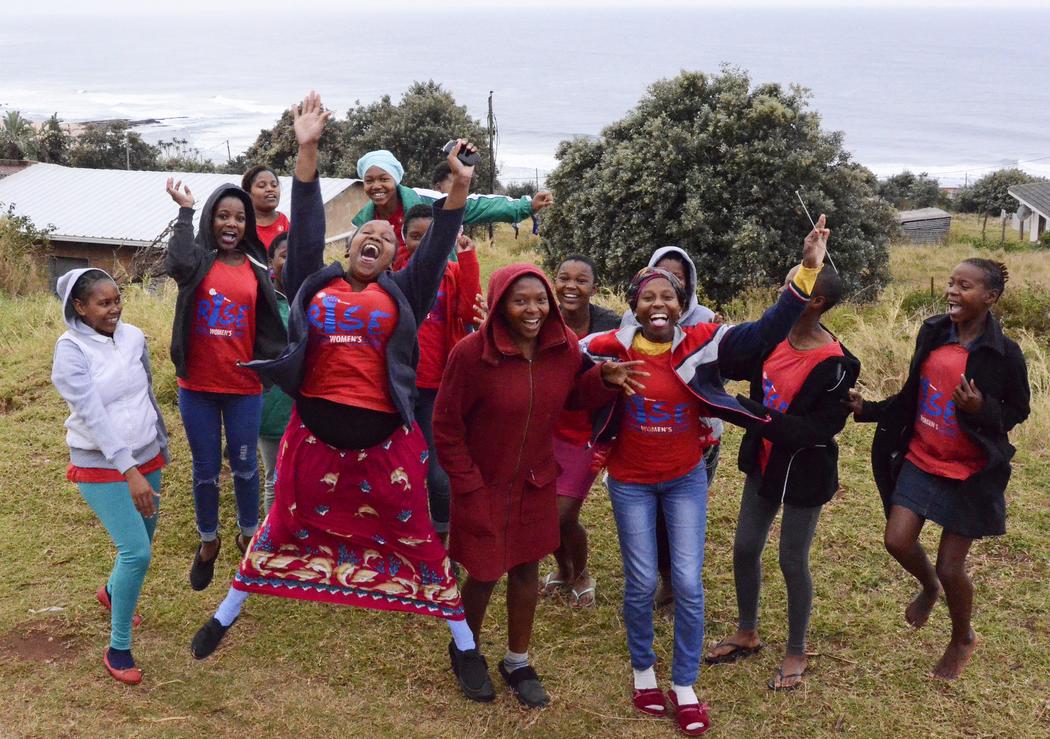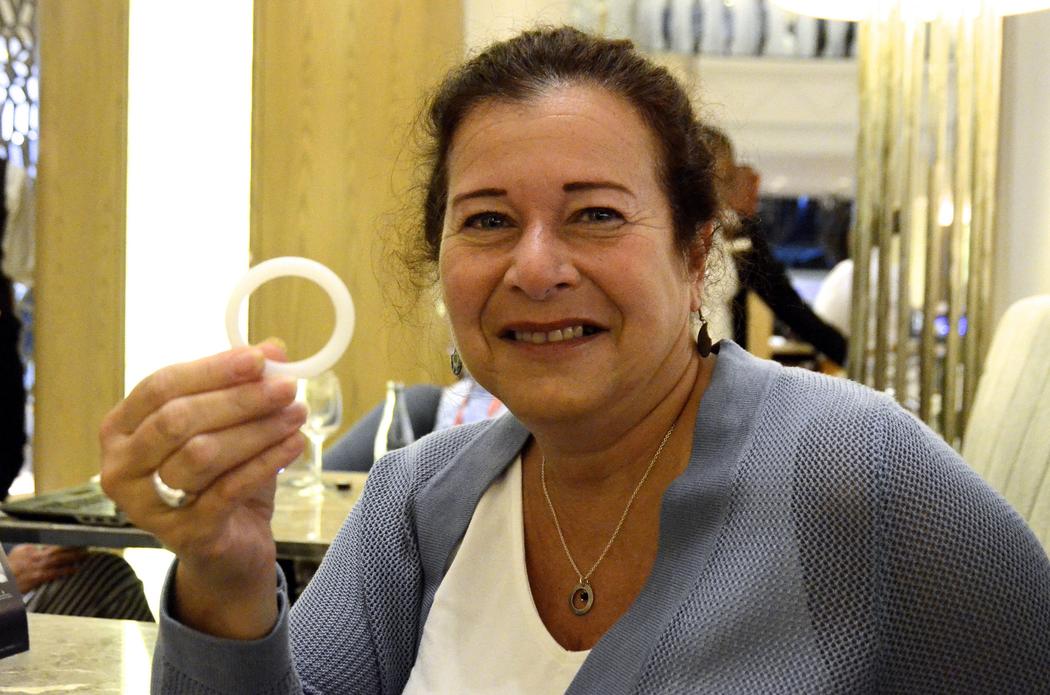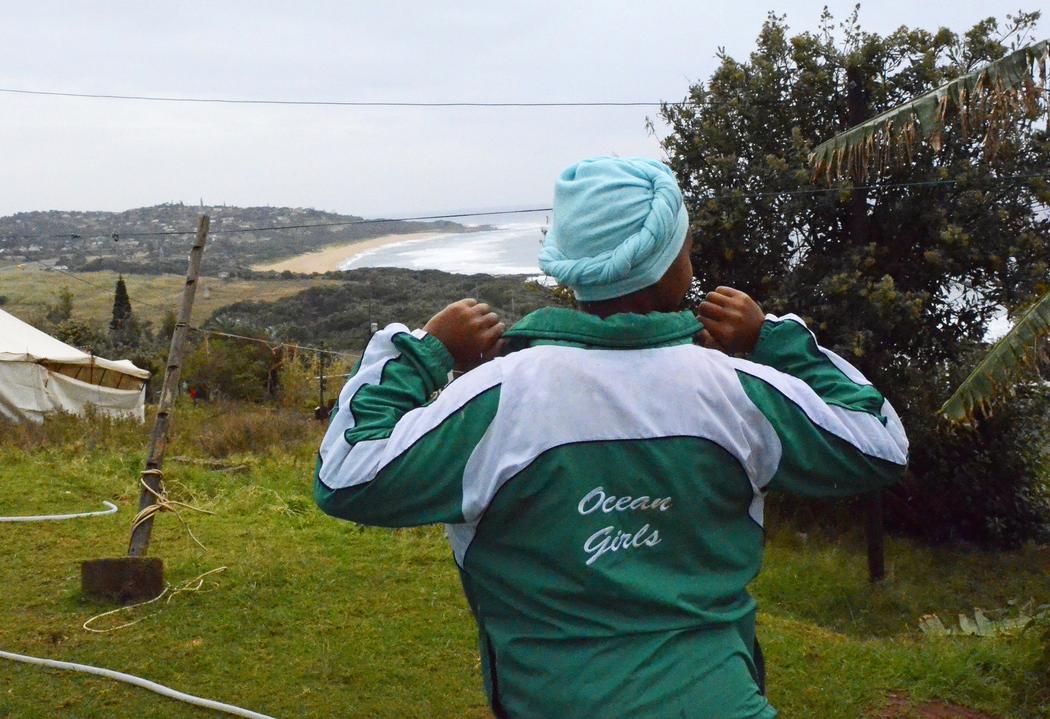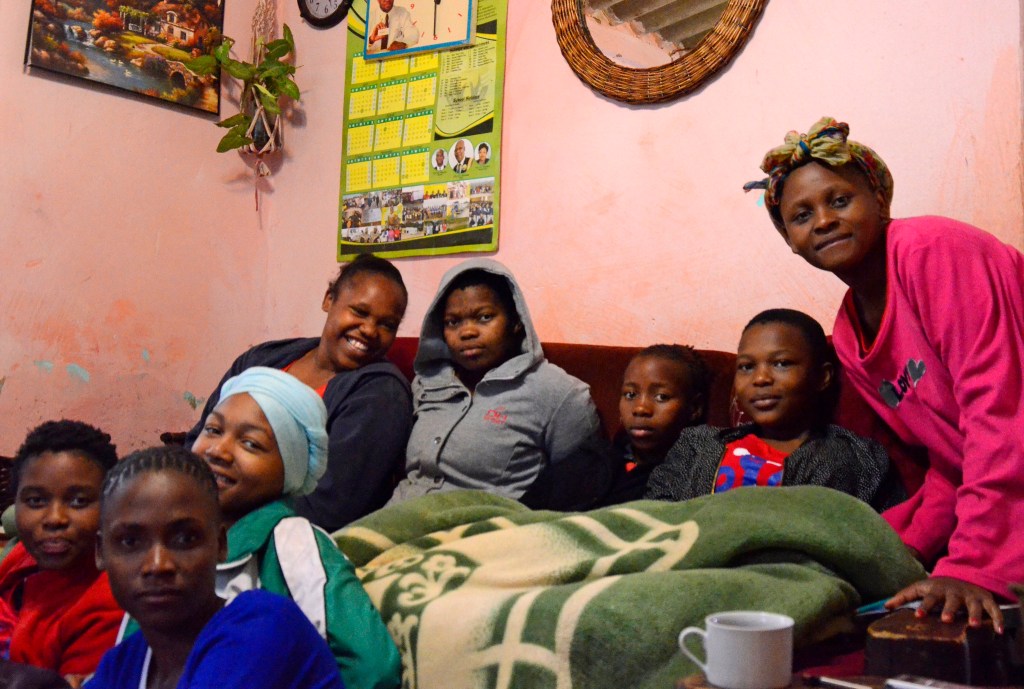“Blessers are everywhere,” Naledi Tsikedi, 17, tells me, leaning forward in her chair. In the courtyard below, I can hear her classmates hollering, overflowing with adolescent energy as school lets out. Tsikedi, dressed in a blue and white track suit with the name of her high school emblazoned on the front, has stayed behind to speak with me about sex and HIV.
Like all the women I interview in South Africa, she’s encountered plenty of these men, known as blessers, who give younger women gifts or money in return for sex. The transaction is generally subtler than sex work. It may begin when a guy invites a teenage girl to a party and offers her beer—not unlike what happens in the United States. Only in South Africa, he has this virtuous name, and the relationship is more dangerous because HIV is rampant. Here in KwaZulu-Natal, a coastal province in eastern South Africa, up to one in four adults test positive.
“Taxi drivers pull over when I’m walking home from school. They say, ‘I’ll take you wherever you want and buy you chips,’” she says. “I don’t do it, but a lot of girls do. This blesser thing is popular. It’s getting worse.”
Young women are now of interest to scientists as the HIV epidemic shifts toward that demographic in southern and eastern Africa, where more than 5,000 adolescent girls and young women are infected every week. Protecting these girls has proven to be a monumental challenge, despite the existence of condoms and new drugs that block infection. At a recent meeting in Chicago, researchers gave presentations on new tools for prevention, as well as how to better understand adolescent brains and behaviors. While there have been a number of recent advancements in treatments for HIV prevention, research shows that medicine only goes so far in addressing the root causes. What really needs to change are social norms and economic imbalance.
Videos by VICE

South Africa supports “rise groups” to empower young women at risk for HIV.
A few months before the Chicago meeting, I traveled to South Africa with questions about what makes young women so vulnerable to the disease. That’s when I learned about the blessers.
In one low-income, seaside neighborhood in KwaZulu-Natal, Minenhle Zwane, a talkative 25-year-old with a red head-wrap, says blessers keep an eye out for women in need. “If you’re the breadwinner at home, taking care of your brothers and sisters, there will surely be a guy who sees the situation and says, ‘Let me help you,’” she says. “But at the end of the day, he will expect to sleep with you.”
In another suburb of KwaZulu-Natal, one infamous for its high rate of crime, Shalees Mazuba describes the dependency of women on men in her neighborhood as harmful. The father of her two children died of HIV after he was infected while having an affair, and now Mazuba (her name has been changed) is living with the disease and supporting her kids by recycling cans. As her young daughters play in the backyard, she says she worries about how to protect them from predatory men once they reach adolescence. She reminds them, “Nothing for mahala.” Nothing in life comes for free.
Blessers recently caught the attention of biomedical scientists. In a study presented in July at the International AIDS Conference in Durban, South Africa, researchers revealed how the virus spread within KwaZulu-Natal. They sequenced the virus from 1,600 HIV-positive people and found that women ages 16 to 23 had similar versions as men about eight years their senior—implying that the older men had infected the young women. When those young women grow up, they pass HIV to their same-age partners, some of whom have affairs with younger girls. Specifically, the researchers linked 39 percent of men over age 25 with very young women as well as with those their age and older. The study had provided further details on age disparities already documented: For example, in one survey in KwaZulu-Natal, 24 percent of females under age 21 tested positive for the virus, while just 2 percent of males the same age did.
Studies reveal that most young South African women do not adhere to the treatments.
Because young women represent a high percentage of those infected, organizations such as the Global Fund, the US AIDS agency, PEPFAR, and the National Institutes of Health have supported dozens of initiatives to protect them and break the cycle. Many of these efforts center on pharmaceuticals. Specifically, scientists have focused on giving healthy people HIV drugs known as Pre-Exposure Prophylaxis, or PrEP. The reality being what it is, scientists argue that PrEP offers women a practical way of lowering their risk of infection.
Studies, however, reveal that most young South African women do not adhere to the treatments. “The results of these trials sent us reeling,” says Sandra McCoy, an infectious disease epidemiologist at the University of California, Berkeley. “We thought, ‘What are we doing wrong?’”
To find out, Nomtika Mjwana, a 23-year-old South African activist for sexual and reproductive health justice, suggests that scientists should pay closer to attention to what young women say. She explains that women won’t take drugs if the factors that lead to their risky behaviors are not adequately addressed. “You must understand why a woman ends up with a blesser,” Mjwana tells me. “Is it because they like sex, is it because they’re careless to the core? Is it because they feel pressure, or need sex for money, or are they forced?

Rosenberg holds a model of the vaginal ring developed to protect women from HIV.
Prior to PrEP, male circumcision and condoms were the main tools for decreasing the risk of HIV—short of abstinence. Those interventions work, but they require action on the part of men—and their effectiveness has plateaued. For the past decade, 2.5 million people have continued to be infected with HIV every year. In a series of trials reported in the New England Journal of Medicine between 2010 and 2012, researchers discovered that healthy, uninfected people could protect themselves by taking daily antiretroviral pills in the weeks before having sex. Clinical trials found that the pills—brand name Truvada—were up to 92 percent effective when people took them as directed. Since 2012, doctors in the US have prescribed Truvada to more than 50,000 adults—mostly gay men in their 30s. Last year, the World Health Organization recommended PrEP to people in high-risk groups, such as gay men, sex workers, and young women who live in hotspots for HIV like South Africa.
Scientists are launching more than a dozen studies to find ways to improve compliance.
Gay men and sex workers in the US and elsewhere have protested for the right to access these drugs. At the AIDS meeting in July, men proudly displayed T-shirts that read Truvada Whore—an attempt to diminish stigma surrounding the products. But on the contrary, young women have proven reticent to PrEP in trials in southern Africa. In studies on Truvada, young women skipped doses, complaining of mild, temporary side effects like nausea, and a fear of having their parents or partners find out about the treatments. Results were likewise lackluster in a large clinical trial completed this year on a vaginal ring containing Dapivirine—a reverse transcriptase inhibitor that blocks the virus’ ability to replicate. Women ages 18 to 21 acquired HIV as often as those in the placebo group; biochemical tests on the used rings showed that, on average, they had removed the rings during the course of every month. (The ring did, however, decrease HIV in women over age 25 by 61 percent because they kept it in.)
In response to these sobering results, scientists are launching more than a dozen studies to find ways to improve compliance. These studies typically occur in South Africa, because that’s where the risk is highest. For example, later this year researchers will enroll up to roughly 8,000 adolescents in a study in which teens pick up PrEP at health clinics where counselors have been trained to treat them with kindness and discretion. In another proposed trial, researchers will give young women cash for taking PrEP consistently for several months. “The idea is to get young women through that first period of habituation, because we know the side effects get better over time,” says Linda-Gail Bekker, director of the Desmond Tutu HIV Center in Cape Town, South Africa.
Scientists are also developing pharmaceuticals that require less maintenance, such as an injection of antiretroviral drugs that prevents infection for a month, and a vaginal ring that combines birth control with HIV drugs. Research clinicians who have felt bewildered by the lack of tools they can offer women are abuzz with the new products. They compare what’s happening in the field to the blossoming of birth control in the 1960s. Zeda Rosenberg, a microbiologist and chief executive of the organization developing the Dapivirine ring, the International Partnership for Microbicides, explains the similarity: “It gave women more control over what they wanted to do with their lives.”
The emphasis on PrEP, however, overshadows systemic injustices that women face around the world. To some researchers, that’s an excusable fault: Social transformation takes time and, until then, PrEP provides a quick fix. But many other people argue this strategy simply won’t work. To comply with PrEP, a person must truly prioritize HIV prevention. After all, this is no simple treatment. When women are overwhelmed with worries about rape, exploitation, or where their next meal comes from, they are unlikely to add the additional burden of treating a disease they don’t have.Mjwana makes the weight of these distinctions clear. “It is one thing for me, a young black woman in an urban area to say I’d like PrEP because I enjoy sex, and another thing to recommend PrEP to a young lesbian because she fears corrective rape,” she says, referring to the crime of assaulting a woman with the intention of reversing her orientation. “You’re just burdening that women with additional responsibilities and not addressing an unjust system.”
Quarraisha Abdool Karim, an epidemiologist at the Center for the AIDS Program of Research in South Africa (CAPRISA), acknowledges these complexities. She has tried to curb HIV through social interventions. Having been a teacher, Karim suspected that some teenagers—particularly those who were poor and non-white—adopted risky behavior because they didn’t believe in their potential. Her hope was to instill a sense of confidence that would make young women more likely to demand that their partners use condoms. Between 2010 and 2012, Karim rewarded teenagers cash in exchange for taking an annual HIV test, earning decent grades, completing a business-centered project, and attending an after-school program. “I taught them about sexual reproductive health,” Karim says, “as well as career planning and their rights in democratic South Africa after three decades of apartheid.” But the teenagers she had wanted to reach most—those in dire straits—didn’t show up. “Kids who had sick parents or no parents had a lot of chores to do, like working in the fields or getting water after school, so my extracurricular program never benefited them.”
In retrospect, Karim says the intervention might have been better tailored to suit a rural community specifically. Her mode of operation often functions through trial and error. She’s constantly adapting HIV prevention programs at the satellite health clinics that CAPRISA operates around KwaZulu-Natal. Staff at these clinics have found that they must address adolescent needs ranging from birth control to career counseling, and they travel into communities so that young women aren’t expected to go far for help. They also experiment: In one study, CAPRISA clinicians are offering uninfected women Truvada pills, in addition to their usual array of services. The staff hope compliance at CAPRISA will be better than in past trials because the centers gained the trust of communities over the past decade. At CAPRISA, researchers have also solved a mystery about why young women are getting infected at such high rates, although most of the men they sleep with don’t have the disease. They’ve found that many of their HIV-negative clients have sexually transmitted diseases like herpes and vaginal infections, and scientists have shown that these problems render women more susceptible to HIV. One explanation for why is that immune cells pour into vaginal tissue where the virus readily infects them.
When I meet with five young women on a cold morning at a CAPRISA clinic nestled in snow-encrusted mountains, they voiced their admiration for the staff, who relate to them and withhold judgment. Three teens in knit caps tell me they’d be willing to take Truvada. “I’d take it even if I had a boyfriend who says he is loyal and doesn’t have HIV,” one of the girls says, under condition of anonymity. “I don’t trust a word of what men say!”
Karim says her next challenge is to reach out to men. If she can connect with the blessers, she hopes to incentivize them to get tested for HIV. When a person is treated for the disease, it lessens the risk of passing on the infection. And once these men are at a clinic, staff might also persuade them to see themselves as protectors of young women instead.
On a Sunday afternoon, a dozen women ages 13 to 25 curl up on couches in the living room of a small house looking over the Indian Ocean in KwaZulu-Natal. They’ve gathered to talk with me about their all-girls club. As a thunderstorm rages outside, a board member of the group, Sanelisiwe Madwe, passes around a pile of blankets to counter a damp chill in the air. Madwe lives in this two-bedroom, bathroom-less house with her sister, their two babies, her niece and mother. All of the girls in the living room have known each other since childhood. A couple of years ago, the group was made official as belonging to a branch of the Soul City Institute for Social Justice in South Africa. South Africa’s government and the Global Fund to Fight AIDS, Tuberculosis and Malaria recently supported the Institute in forming “Rise Young Women’s Clubs,” justifying them as a source of empowerment for young women, and as a venue for HIV education. “As women alone it is easy to talk about personal things,” Madwe tells me. This particular Rise Club decided to call themselves the Ocean Idols, a reflection of the solace they feel when watching waves fade into the horizon.
To take PrEP would mean admitting they have sex in a society that values virginity before marriage.
The Ocean Idols volunteer to wash clothes for “grannies.” They tend a community garden, although goats have nibbled it to shreds. They knit scarves, play sports, and sew traditional Zulu outfits dripping with cowrie shells, which two members proudly model. They also show me “Rise Club” magazines distributed by Soul City that contain informative articles on safe sex, reproductive health, and career planning. But it looks as if no one has leafed through the pages.
For a couple of hours, the girls swap stories about dating and about what it’s like to be a teenage mom. They disagree about how the South African sprinter and double amputee, Oscar Pistorius, should be punished for killing his girlfriend. They argue about whether women are at fault when they take blessers. No one admits to having done so themselves, but a baby-faced young woman, Nonhle Khomo, informs me that if any among them had, they’d keep it secret because of the stigma involved. Then she shouts out a solution. “If we had job opportunities, this blesser thing would go away,” she says with a look of exasperation. “Look at our background! We don’t have nothing!”
When I bring up HIV, the talk centers on people they know with the disease. Then the conversation returns to their lack of income. The girls dream up services they’d provide for cash: They could make meals for school children who have no food at home. They could run after-school activities. They could hand out contraceptives. They could write articles for “Rise Club” magazines.

Samkelisiwe Madwe wears a jacket embroidered with the name of her all-girls group.
None of the Ocean Idols have heard of PrEP because the drugs are fairly new, and the women live in a rural region served by inadequate public health services. But the girls don’t like the sound of it, anyway, because it does not address the prevalence of rape and the lack of income that renders them vulnerable to older men. To take PrEP would also mean admitting that they have sex in a society that values virginity before marriage. “Ah, no, it is a crazy idea!” Madwe decides. “Scientists must sit down and think of something else. Young people will be very ashamed to take such a thing.”
Her sister, Hlengi, agrees. “I think scientists look at the bright side, but not the bad side,” she says.
“Are they really thinking about how all of these things affect us?”
Photos: Amy Maxmen/Flickr
Travel for this story was supported by the Pulitzer Center on Crisis Reporting.
More
From VICE
-

Photo: Catherine Falls Commercial / Getty Images -

Photo: RYosha / Getty Images -

Screenshot: Running with Scissors

